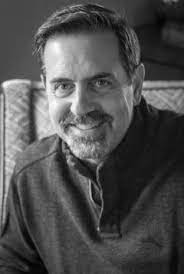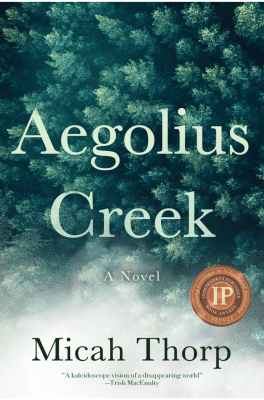Back to the Indie Corner series
Micah Thorp is a physician and writer in Portland, Oregon. His first novel, Uncle Joe’s Muse, won a 2022 Next Generation Indie Book Award and a Foreword Indies Book of the Year Award. A sequel, Uncle Joe’s Senpai, was published in 2023. His writing has been published in Cleaver Magazine, Fictional Cafe, and Blind Corner. His third novel, Aegolius Creek, the winner of a 2025 Ippy Award for West-Pacific Best Regional Fiction, was published September 16, 2025.

Aegolius Creek (Type Eighteen Books, 2025): The novel “is a study of entities at war with each other: humankind at war with nature, nature at war with itself, and a population fighting to find the balance between progress, tradition, and conservation. The story takes place in Oregon’s abundant forests, where logging companies wrangle for more footage, environmentalists lobby for control, and homesteaders dig in to protect their ownership rights.” – BookLife from Publishers Weekly
Mary: Hi Micah! Thanks for joining Dragonfly’s Indie Corner. Tell us about Aegolius Creek and what inspired it, or was it accidental?
Micah: The definitive story about Oregon in the mid-twentieth century is Ken Kesey’s Sometimes a Great Notion, a novel about a family on the south Oregon coast that runs a small logging company. They are a hard, fiercely independent clan that finds themselves in a union fight. My father is from that area, and the characters in the novel could have been my uncles and cousins. I grew up in a different timber community on the western slopes of the Cascade mountains during the 1980s and 90s, in the middle of a conflict that led to the end of the culture described by Kesey. In the same way, I wanted to write about the effect of that conflict on the land and the people who live on it.
Mary: How does your book align with nature and place?
Micah: Aegolius Creek is about nature, place and what it means to be a part of both. It’s about the responsibility of land ownership, the role of government, and how where we live affects who we are. Each chapter in the book begins with a short anecdote about Aegolius Creek in an effort to bring it alive for the reader. Many of the descriptions of Aegolius Creek are based on the Mohawk Valley outside of Springfield, Oregon. The conflicts in the story are built around different perspectives of nature and place.

Mary: Does your book have a message, or do you consider it more a piece of art? Or both?
Micah: Hopefully both. As we navigate societal and economic changes needed to combat climate change, it’s important to consider that some will bear more of the burden than others. Ending old growth logging in the Pacific Northwest was the right thing to do, but conflict between groups devastated small communities that relied on logging. The impact of those changes are still apparent.
I think it was equally important to make the place something of a character in the story. Describing a place over the course of a novel is much like describing a character. I wanted to make the descriptions and prose reflective of the beauty of the place.
Mary: What other writers and books do you enjoy and why?
Micah: Aside from Kesey, who inspired Aegolius Creek, my favorite authors are Ernest Hemingway and Tony Morrison. Hemingway was the master of the declarative sentence and Morrison of the complex paragraph. In many ways they are opposing styles, but both embody the distinctive nature of American literature.
I used to wonder exactly what it was that drew me to very disparate writers I suspect it has something to do with the care they all employed in the process of editing. Hemingway was notoriously precise in everything he wrote and Morrison supposedly couldn’t read a newspaper or magazine without a pen to help her edit as she read.
Mary: What else led you to the creative outlet of writing?
Micah: I’ve always liked to write. During the pandemic, I started to get serious about my writing. A couple of years later, my first novel was published.
The pandemic was a strange combination of incredible intensity and abject boredom. I’m a nephrologist, so most of my patients have significant illnesses and were at high risk of succumbing to the virus. When it first began to spread, we pulled out all the stops, reorganized everything in the hospital—how we managed outpatients and what we were going to do to reuse PPE. Everyone had a job, in addition to their usual patient care. Before the first wave hit, I was put in charge of finding facilities that could be converted into field hospitals if our facilities ran out of room. We went to churches, schools, and emptied stores. Fortunately, we never used the extra space, but the thought we might need hundreds of excess beds was daunting. When infected patients finally began to be admitted, it was a bit terrifying. The death rate was high and the fear of being infected was great. It was a tough time. In the midst of the virus, I’d come home every night needing to do something that had nothing to do with medicine. I started writing and never really stopped.
Mary: What writing communities are you a part of, and how do they help?
Micah: Writing is a solitary craft, but being a part of a group improves both the quality of your work and your attitude about it. I’ve been part of a group called Novelitics that started during the pandemic. They have been instrumental in my development as a writer. Getting feedback, encouragement and ideas are incredibly helpful in forging a piece of written work.
Mary: What’s next for you?
Micah: I’m working on a novel about Vanport, Oregon. Vanport is a fascinating story by itself. The industrialist Henry Kaiser needed housing for his shipbuilding workers in Portland during WWII. The city wouldn’t provide enough, so he took some swampland north of the city and built a small city over the course of less than a year. It had schools, stores, a hospital and community center. By the time it was built, Vanport was the second largest city in the state. After the war ended, returning GIs took up residence. Then, on May 31st, 1948, the entire city was washed away in a flood.
It’s a great setting. I’m hoping my story will be worthy of the actual historical event.
Mary: Sounds fascinating. Thanks so much for contributing to Indie Corner, where independent writers of eco-fiction help to build stories about our connection with the natural world.